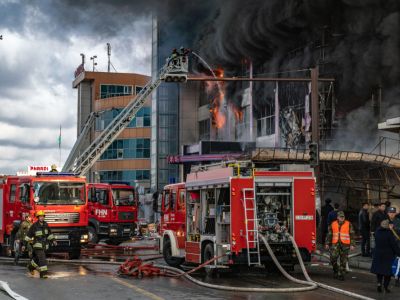Eight Iraqis were killed and three others wounded in air strikes Sunday by US and British warplanes on southern Iraq, the official INA news agency reported Monday.
The raids hit Salhiya region, in Wassel province, around 170 kilometres (105 miles) south of Baghdad, INA said, blasting "another savage attack by the United States and Britain against Iraqi citizens," according to AFP.
"Enemy US and British planes fired three missiles and some cluster bombs," the agency reported, quoting witnesses as saying "the victims had been preparing for prayers."
According to INA, palm groves in Salhiya were also destroyed in the attack.
The deaths take to 365 the number of people Baghdad says have been killed in US-British raids since December 1998.
British and US warplanes patrol no-fly zones imposed over northern and southern Iraq after the 1991 Gulf War to protect the regions' Kurdish and Shiite Muslim populations from Baghdad.
The attack came aims US reports that Iraq is upgrading its military technology and developing weapons of mass destruction in the absence of international monitoring.
The US Defense Secretary, Donald Rumsfeld, was quoted by reports as saying that Iraqi efforts were gathering pace since UN weapons inspectors left Iraq in late 1998.
"They have an appetite for weapons of mass destruction," Rumsfeld told Fox television.
"They have been, every period since they have been able to get the inspectors out of there, working diligently to increase their capabilities in every aspect of weapons of mass destruction and ballistic missile technology. And as they get somewhat stronger, the problem becomes somewhat greater."
"And that problem, particularly biological weapons, over the coming decade is going to be an increasingly serious one," he said.
Airstrikes have limited effectiveness against sites where the weapons are developed or deployed, Rumsfeld said, because some of those sites are underground or mobile.
The problem "will have to be attacked from a whole range of methods," he said.
"To the extent other countries keep trading with him and improving his fiber optics and improving his ability to cue and network, the risk level goes up," Rumsfeld told CNN television later Sunday.
"And then the United States and (Britain) are forced to go in and take out those capabilities."
US and British warplanes have carried out four other attacks on Iraqi air defenses since 25 August to enforce the no-fly zones imposed after the 1991 Gulf War.
The zones are not mandated by any UN Security Council resolution – Albawaba.com
© 2001 Al Bawaba (www.albawaba.com)









